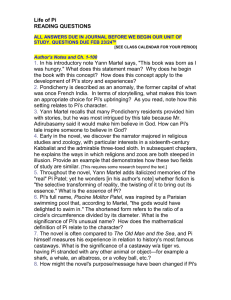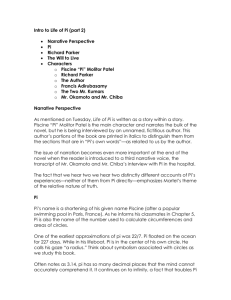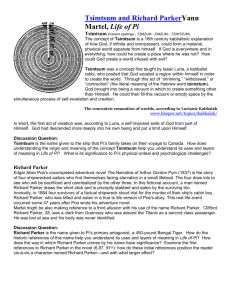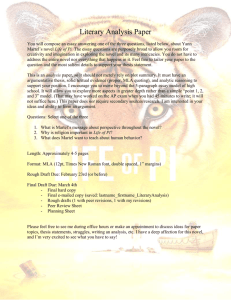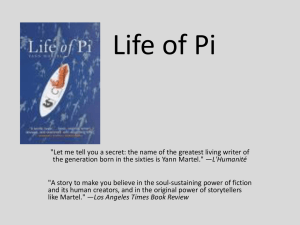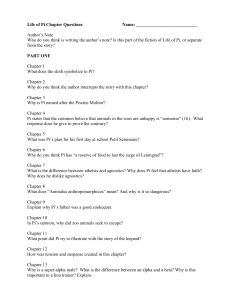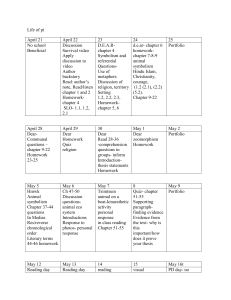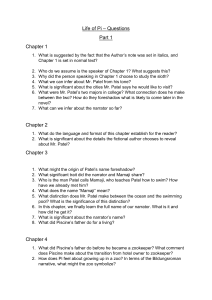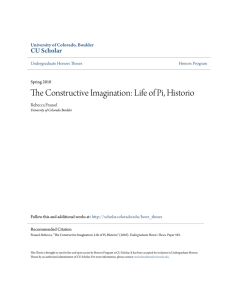life of pi essay
advertisement
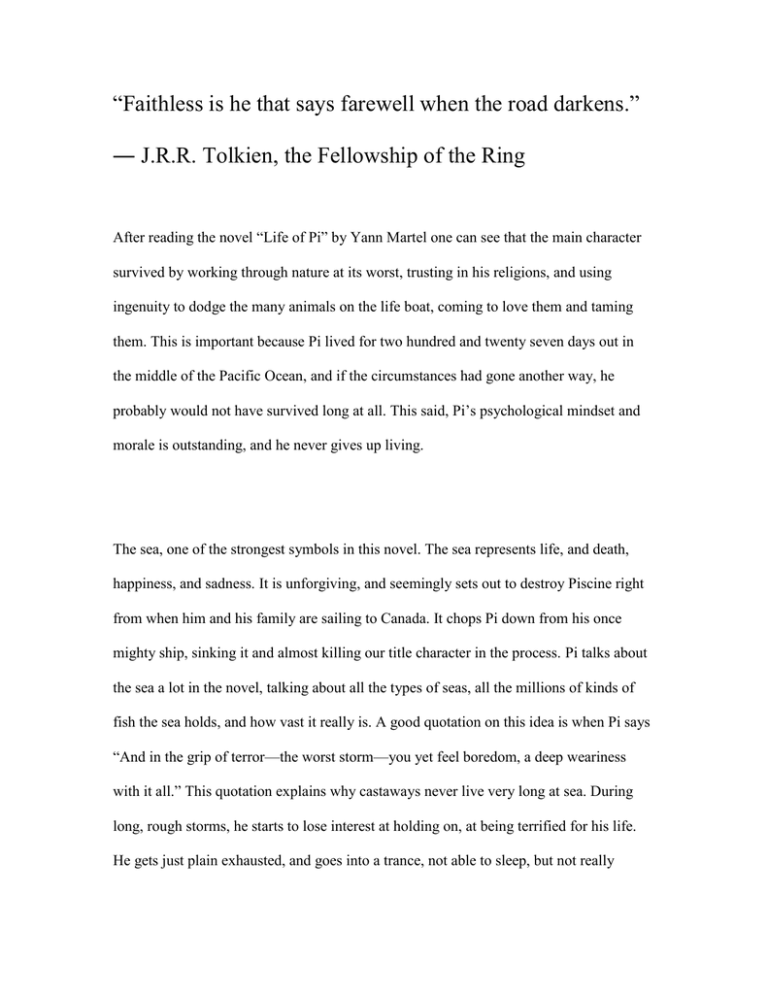
“Faithless is he that says farewell when the road darkens.” ― J.R.R. Tolkien, the Fellowship of the Ring After reading the novel “Life of Pi” by Yann Martel one can see that the main character survived by working through nature at its worst, trusting in his religions, and using ingenuity to dodge the many animals on the life boat, coming to love them and taming them. This is important because Pi lived for two hundred and twenty seven days out in the middle of the Pacific Ocean, and if the circumstances had gone another way, he probably would not have survived long at all. This said, Pi’s psychological mindset and morale is outstanding, and he never gives up living. The sea, one of the strongest symbols in this novel. The sea represents life, and death, happiness, and sadness. It is unforgiving, and seemingly sets out to destroy Piscine right from when him and his family are sailing to Canada. It chops Pi down from his once mighty ship, sinking it and almost killing our title character in the process. Pi talks about the sea a lot in the novel, talking about all the types of seas, all the millions of kinds of fish the sea holds, and how vast it really is. A good quotation on this idea is when Pi says “And in the grip of terror—the worst storm—you yet feel boredom, a deep weariness with it all.” This quotation explains why castaways never live very long at sea. During long, rough storms, he starts to lose interest at holding on, at being terrified for his life. He gets just plain exhausted, and goes into a trance, not able to sleep, but not really awake, just hoping time will go by faster, and the storm will end. This is explained well when Pi comments “The worst pair of opposites is boredom and terror. Sometimes your life is a pendulum swing from one to the other.” Another Idea of how Martel fluctuated Pi’s preparation for fate was the animals on the lifeboat with him. Although they were all a threat, they helped him to survive by keeping his mind off of the inevitable, that he is going to die in the middle of the ocean with no one left to care in the world. Instead of dwelling, he had to use his time to getting food for both him and Richard Parker, and also in taming the big orange cat, so it does not just turn around and kill Pi because he was in a bad mood. Pi sees, however, the pros and cons to his lifeboat being the equivalent to Noah’s Ark, knows that Richard Parker is keeping him alive by trying to kill him, keeping him from doubting his survival and giving up. Pi and Richard Parker are also character foils of one another. Both put in the exact same trying circumstances, one is a carnivore and one a vegetarian. Their names both changed by clerical errors, Richard Parker mixed up with thirsty, while Pi because people kept teasing him for the mispronunciation of his name. Pi also treats Richard Parker as a human, adding anthropomorphism to the tiger’s character. Pi talks to him, and complains that Richard can’t support himself and get his own food. Yann Martel’s view on religion is that it is illumination for the mind of the holiest kind. He does not discriminate between different religions in the novel, but quite the opposite, embracing all religions and accepting them for what they are and what each one brings to the table, then putting all of those elements together to form almost a new religion but with elements from all other faiths. The author expresses this binding of religion through his main character Piscine Molitor Patel, a faithful Christian, Hindu, and Islam. He chooses these three religions at a young age, but they are not tested until the cargo ship Tsimtsum crashes and he is stranded on the lifeboat with only animals as company. As the best way to test ones faith is to bring a challenge and hardship upon them and see if their faith falters or fails completely. When was faced with his dilemma, when times got rough he would only turn to god more and more, trying to connect with his religions. Pi explains the connection between his faiths by adding “Hindus, in their capacity for love, are indeed hairless Christians, just as Muslims, in the way they see God in everything, are bearded Hindus, and Christians, in their devotion to God, are hat wearing Muslims.” His Religions helped him prepare mentally for what was to come, whether it is rain for five days strait or running across a floating carnivorous island. Life of Pi is a novel filled to the brim with symbols, ideas, mystery, action, and disbelief. Pi is prepared to die many times, but is always brought out of his gloom and back to life. On being prepared to die, Pi quotes “Oncoming death is terrible enough, but worse still is oncoming death with time to spare, time in which all the happiness that was yours and all the happiness that might have been yours becomes clear to you.” (Pg.185-186). Pi manages to always be prepared, and tries to keep ahead, collecting more food than he can eat sometimes, but the basic needs of life always keep up, and after a while strive ahead. Quoting from Maslow’s Hierarchy, at first Pi is able to not only succeed in providing basic needs, but building a safety raft, and connecting with god. He tries not to spend much time thinking about his family, for every time he does Pi is overwhelmed with a sense of hopelessness. Another great idea in the novel is Pi’s name which is an irrational number which goes on forever, just like the Pacific Ocean in which he is stranded in. Pi also survived for two hundred and twenty seven days, while twenty two divided by seven is 3.14…., which is Pi. Preparing for fate is one thing that Piscine Molitor Patel did so well, and therefore, stayed alive.

